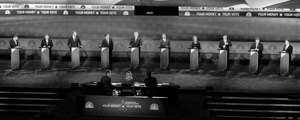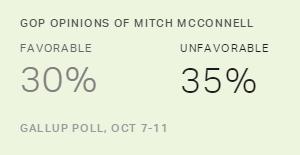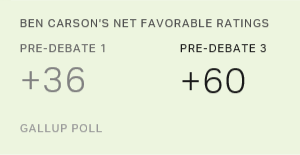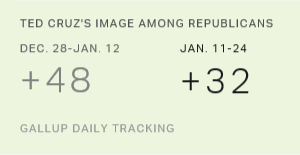Republican presidential candidates have been involved in three nationally televised debates so far this year. The debates are primarily focused on providing potential Republican voters with the opportunity to look over the field of candidates. But independents and Democrats can't help being exposed to the events, if not directly by virtue of watching live -- and the debates have, in fact, enjoyed record-breaking viewership levels -- than through the extensive news coverage that follows. So an interesting question arises as to the possible impact of the debates on those Americans who are not Republicans. This is not a trivial concern for the GOP; whoever becomes the party's nominee will, of course, end up facing the general electorate next November.
The average change in candidate net favorable ratings among Republicans between the time period before the first debate and the time period after the second debate (but before the third debate on Oct. 28, whose impact it is still too early to measure) was 10.1 percentage points. I'm looking here at "pure" Republicans who initially identify as such in our partisanship question, different from other analyses in Gallup.com articles that includes Republicans who identify as independents but who, in a follow-up question, say they lean Republican.
By contrast, the average change in the net favorable ratings of the candidates among Democrats over this time period was 1.9 points, and among independents 3.6 points. In other words, as we would expect, the debates had a significantly greater impact on the ways in which Republicans viewed the candidates than on independents' and Democrats' perceptions of them. Democrats' views of the candidates in particular were essentially unchanged over the course of the first two debates.
The direction of the observed changes in net favorable ratings among Republicans has been mixed. As we have documented, candidates like Ben Carson and Carly Fiorina saw their net favorable ratings jump up significantly after the first debate, while Jeb Bush, Rand Paul, John Kasich and Mike Huckabee saw their net favorable ratings drop.
The changes among Democrats have been so small that none are significant in either direction, save perhaps the image of Mike Huckabee, whose net favorable rating dropped by six points.
Among independents, the image changes that did occur were similar to the changes observed among Republicans, with Carson and Fiorina's net favorable ratings up, while Paul's dropped. But as many GOP candidates' images among independents improved as got worse, so there is no evidence that the debates in some systematic way have hurt the images of the Republican candidates among independents or, as we have seen, among Democrats.
The debates did, however, clearly result in increased candidate name identification among independents and Democrats. Most GOP candidates had at least a slightly higher familiarity score among independents and Democrats after the second debate than was the case in July and early August, and candidates like Carson and Fiorina saw big jumps in familiarity among these groups, just as they did among Republicans.
Bottom line: The Republican debates so far this year have been much more visible than debates in past election cycles, in part because of the interesting group of nominees involved, including in particular entrepreneur and entertainer Donald Trump. Whatever the ways in which the debates may have shuffled the candidate field in the eyes of potential Republican voters, Gallup Daily tracking data show there has been little evidence of a systematic pattern of the candidates taken as a whole becoming either better liked or less well-liked so far among Democrats and independents. The relatively small changes that have been observed among these two partisan groups are mixed, with some candidates gaining favor and some losing ground.



